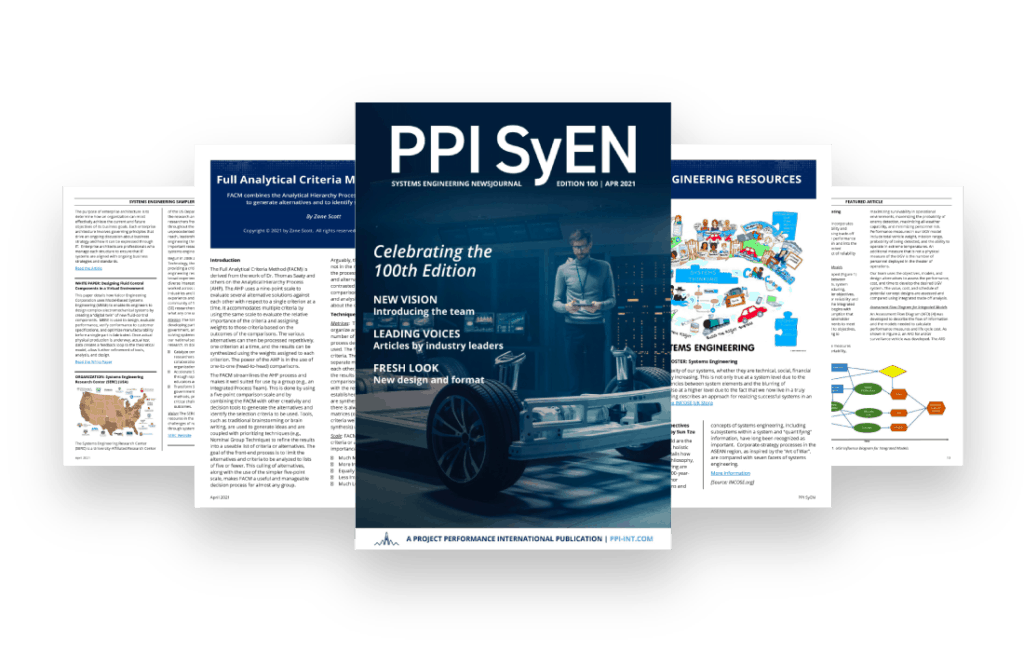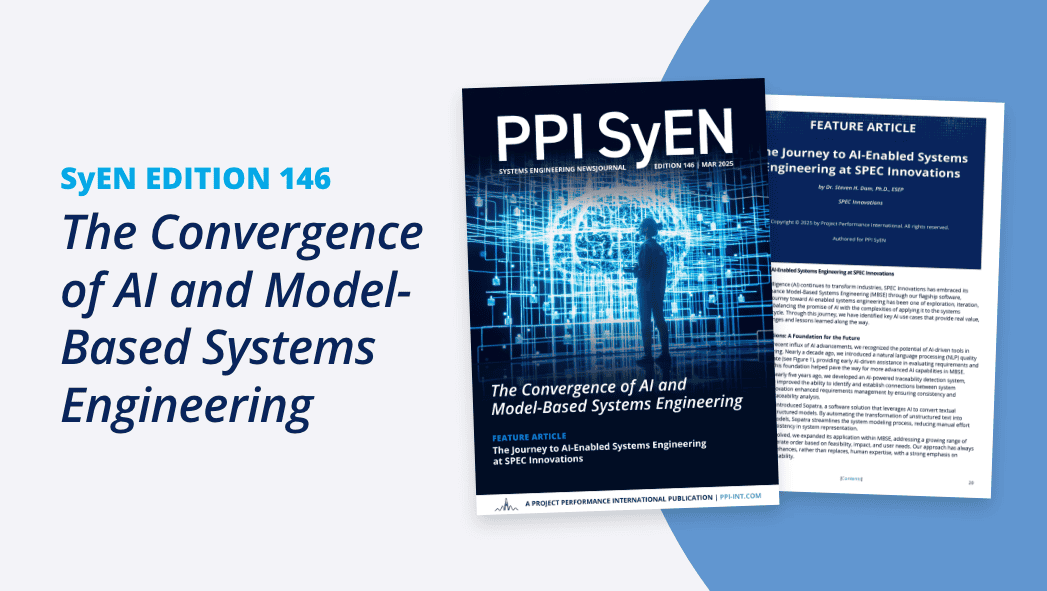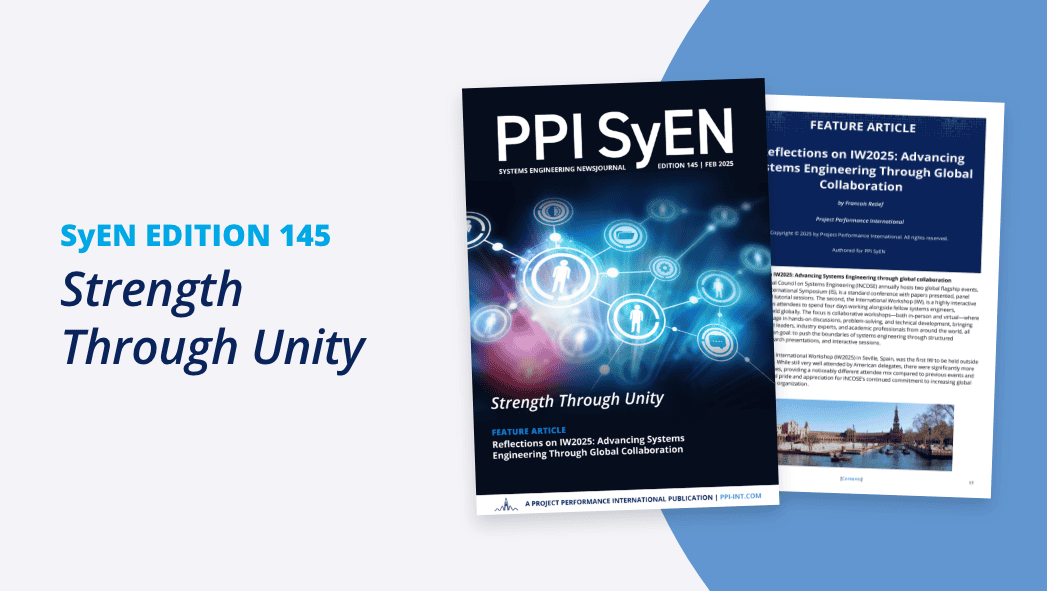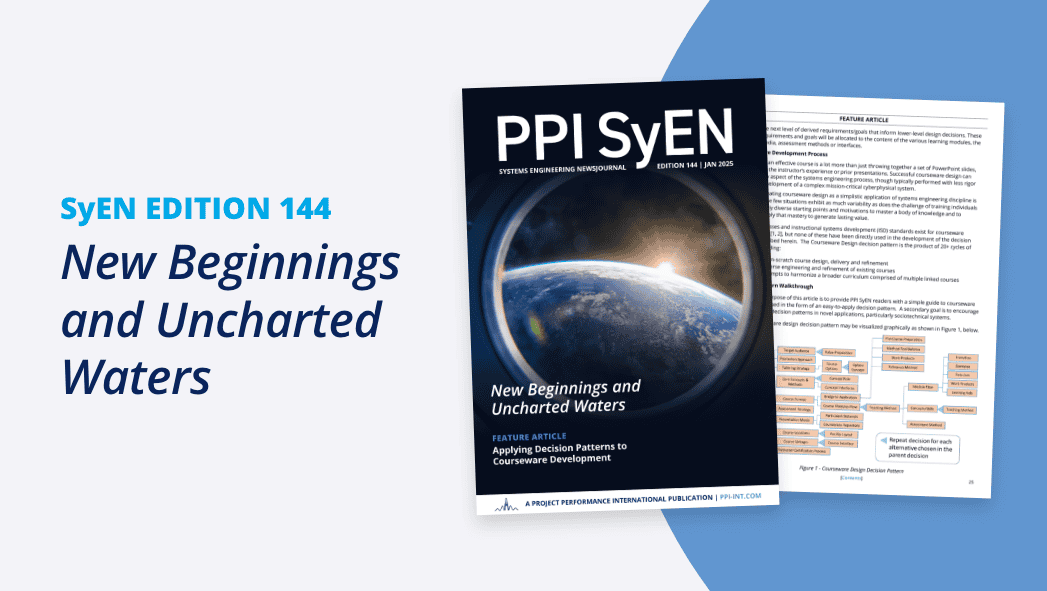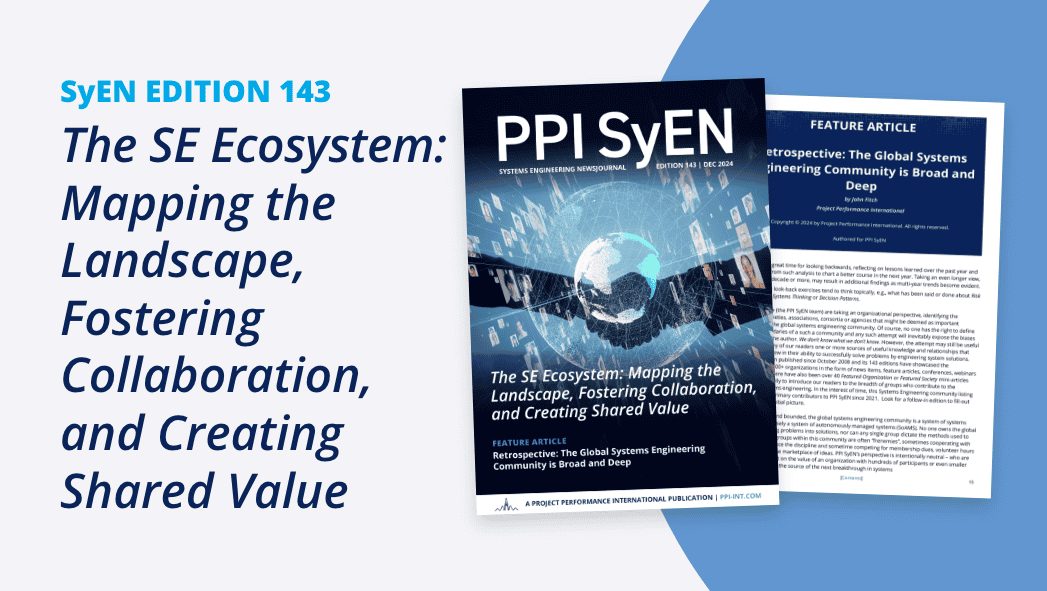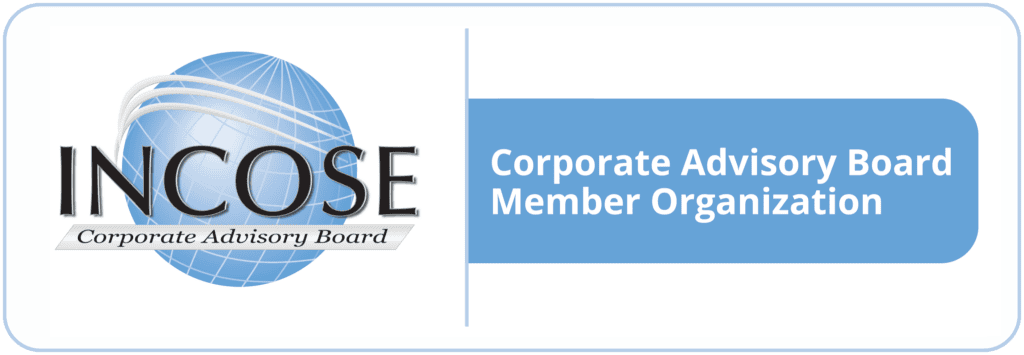What’s Inside:
A Quotation to Open On
Featured Articles –
INCOSE International Symposium 2011 – Denver, CO, USA Robert’s Reflections on the INCOSE International Symposium 2011 … Read More
![]()
![]()
Systems Engineering News
INCOSE International Symposium 2011 – Denver, Colorado
![]()
Upcoming Submission Deadlines and Themes for INSIGHT
![]()
Ten Years of Systems Engineering at Stevens
![]()
Strategy Bridge International CEO Named INCOSE Committee Chair
![]()
Call for Papers – Journal of Software and Systems Modeling (SoSyM) Theme Issue: Enterprise Modelling
![]()
Call for Chapters: Managing Requirements Knowledge
![]()
Cognitive Performance Assessment: Webcast from Cognitive Systems Design
![]()
INCOSE Brazil is Coming
![]()
Featured Society – Institute of Industrial Engineers (IIE)
INCOSE Technical Operations
Complex Systems Working Group
![]()
Systems Engineering Software Tools News
Sparx Systems Releases Enterprise Architect 9
![]()
Systems Engineering Books, Reports, Articles and Papers
Complex Adaptive Systems of Systems (CASoS) Engineering: Mapping Aspirations to Problem Solutions Keeping your Balance
![]()
![]()
Systems Thinking for Sustainability and Supply Chain Risks Growing Wings on the Way: Systems Thinking for Messy Situations
![]()
![]()
Systems Thinking: From Heresy to Practice: Public and Private Sector Studies Systems Engineering Procedia
![]()
![]()
International Journal of Decision Support System Technology (IJDSST) Special Issue on Decision Making Support Systems (DMSS) Development Methodologies: a Software-Systems Engineering Approach Last Word: A Worthwhile Destination
![]()
![]()
Ask Robert – System Breakdown Structures
Conferences and Meetings
Education and Academia
Council of Engineering Systems Universities (CESUN) Brings Together Engineering Systems Units From Around the World
![]()
Opportunity in Austria: Senior Researcher (PostDoc) ‑ Process and Quality Management Postdoctoral Research Assistant in Computer Science at Oxford Brookes University Post-Doctorate Position on Model-Driven Quality Engineering
![]()
![]()
![]()
Johns Hopkins University’s Engineering for Professionals Program Announces Concentration in Human Systems Engineering
![]()
University of Guelph, Canada Tenure Position in Systems Engineering
![]()
Some Systems Engineering-Relevant Websites
Standards and Guides
ISO TC 236 – Project Committee: Project Management
![]()
ISO/IEC JTC 1/SC 7 Systems engineering standards update
![]()
Some Definitions to Close On – Six Sigma
PPI News
Alwyn Smit Stepping Down as SyEN Editor
![]()
Welcome Ralph Young
![]()
PPI at INCOSE IS11 in Denver
![]()
PPI Course Calendar
![]()
PPI Events
![]()
A Quotation to Open On
“The best place for off the shelf is on the shelf” – Don Sydleman, making the point that the risk associated with integrating a COTS product (that one doesn’t own or control) into a solution can exceed the risk of development of a product from the ground up.
![]()
Featured Article
INCOSE International Symposium 2011 – Denver, CO, USA
By Alwyn Smit
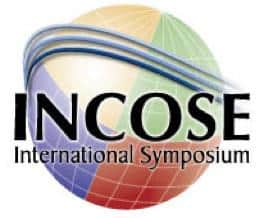
The IS2011 took place in Denver, Colorado from 18 to 24 June 2011. The event kicked off on Saturday 18 June with a full programme of business meetings. John Clark also started the now familiar CSEP Preparation Tutorial that runs over two days. The first day was concluded with the Chapter President’s Reception and the CAB Dinner. The business meetings continued on Sunday, together with multiple half day and full day tutorials and the day came to a close with the Executive Summit Dinner.
The bulk of the delegates arrived on Monday and the registration team had their hands full to process the 800+ delegates. The day was started with a keynote address by Professor Tsuyoshi Fujita from the Japan National Institute for Environmental Studies. With a keynote title of: Low-Carbon Strategies and the Challenge for Cities in Japan, it was not surprising to hear of the central government strategic policies on high-efficiency energy generation, implementation of new social schemes like carbon taxation and the restructuring of cities and regions under low-carbon constraints. Since the late 1990’s, Japan has developed a number of “Eco-town” projects to realize industrial and urban symbioses. In the wake of the natural disaster in March 2011, this has however taken on a completely new scale with complete communities that have to be engineered from the ground up.
Monday also saw the start of the five parallel tracks of papers, panels and tutorials that was continued through to Wednesday with the exception of only four tracks that were presented on Thursday.
The best paper awards announced at the opening plenary included the following:
- Paper 3.2.1: A Study of Systems Engineering Effectiveness: Building a Business Case for SE, Joseph Elm, Software Engineering Institute, Carnegie Mellon University
- Paper 3.2.2: A More Flexible Approach to Valuing Flexibility, Erin Ryan; David Jacques; John Colombi, Air Force Institute of Technology
- Paper 6.3.2: Capability Engineering – An Analysis of Perspectives, Michael Henshaw, Loughborough University; Duncan Kemp, Department of Transport UK; Peter Lister; Andrew Daw, Harmonic; Alan Harding, BAE Systems; Andrew Farncombe, John Boardman Associates; Malcolm Touchin, SEIC
- Paper 7.5.2: Unraveling Systems Engineers from Systems Engineering: Frameworks for Describing the Extent, Variety and Ambiguity of Systems Engineering and Systems Engineers, Hillary Sillitto, Thales UK
- Paper 10.4.2: Convergence of Expert Opinion Via the Wideband Delphi Method: An Application in Cost Estimation Models, Ricardo Valerdi, MIT
• Paper 11.3.1: Transforming the Enterprise Using a Systems Approach, James N. Martin, The Aerospace Corporation
The exhibit hall, as always, was the centre of attraction with a host of exhibitors and in spite of a very busy programme,where lots of networking also took place.
Monday was concluded with the familiar Ice Breaker Reception.
The keynote address on Tuesday was by Chris Barkey, the Chief Operating Officer Engineering & Technology from Rolls-Royce plc. As a growing power system provider, their desired outcome is not only excellent products and support services but also getting a large and complex organization to work as a system within a much greater societal system. The challenge lies in the use of systems methods to not only deliver the benefit of product and service, but to also create organizations capable of doing it in a complex product and business environment. Tuesday was concluded with the social hour in the exhibit hall, allowing yet another opportunity for networking.
Wednesday also started with a keynote address, this time by Vice Admiral (USN Ret.) Conrad Lautenbacher on Global Observation and Systems Engineering. The importance of understanding our environment and harmonizing our activities within that environment in a sustainable manner is absolutely essential. From space to the depths of the oceans we have the means today to observe and understand our planet. The principles and discipline of systems engineering are and will continue to play a role in creating this capability.
The banquet that took place Wednesday night is always one of the highlights of the programme and this year it was no exception. It took place at the Denver Center for Performing Arts where Roy Rivers provided the entertainment. The Chapter Circle Awards were also handed out and after some excellent food and entertainment; the last party animals left the venue just before they could be put in storage together with the tables and chairs.
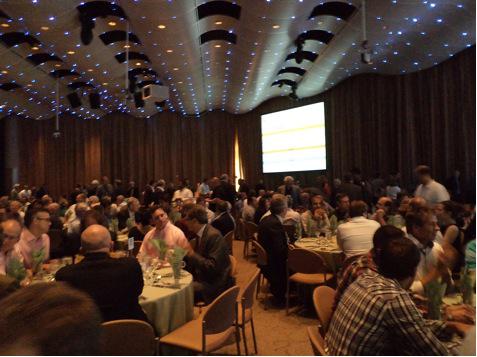
Figure 1: The Banquet that took place on Wednesday night
By Thursday morning the previous busy days and late nights were showing. Kedric Brown, the Vice President of the Global Telecom Center of Competence of IBM Global Business Services, had the unenviable task of delivering the closing plenary address. His account of the history and phenomenal growth of telecommunication technologies, trends and challenges highlighted the need for systems engineering in the global communications industry.
Two technical tours were conducted on Friday, one to the National Renewable Energy Laboratory and one to the Laboratory for Atmospheric and space Physics
Well done to the IS 2011 team for a truly unforgettable conference!
To the IS 2012 team: We are already looking forward to the event in Rome that holds the promise of an even more unforgettable event.
![]()
Robert’s Reflections on the INCOSE International Symposium 2011
Having attended all of the INCOSE International Symposia since 1992, last month’s Symposium, for me, stands out as exceptional. Some of the trends at the Denver symposium which I found particularly encouraging were:
for the first time, a strong emphasis on systems engineering and systems thinking in relation to youth education and undergraduate engineering education
![]()
for the first time, a substantial proportion of delegates holding a view of systems engineering as a skill-set to be possessed by all engineers
![]()
for this conference, a strong orientation towards societal applications of systems engineering, and especially environmental sustainability.
![]()
In my opinion, historically the defence sector has exerted a disproportionate influence on systems engineering thinking and systems engineering resources. The Denver IS, however, involved very, very diverse participation , with medical, energy, transportation, production and information technology sectors all strongly represented. Another pleasing feature was increased and active participation in the symposium from South America, especially Brasil, and the first signs of engagement by enterprises from Middle Eastern countries.
All in all, I felt that the Denver INCOSE International Symposium was a hugely successful event, representing a milestone in the evolution of systems engineering thinking and systems engineering application, for the benefit of mankind.
Robert Halligan
Managing Director, Project Performance International
![]()
Systems Engineering News
Upcoming Submission Deadlines and Themes for INSIGHT
INSIGHT is the newsletter of International Council on Systems Engineering. It is published four times per year (January, April, July, October). INSIGHT features status and information about INCOSE’s technical work, local chapters, and committees and boards. Additionally, related events, editorials, book reviews, trends, and how-to-do articles that are pertinent to the many aspects of a systems engineer’s job are also included, as space permits.
![]()
Ten Years of Systems Engineering at Stevens
A little more than a decade ago, Clifford G. Geiger ’60, formerly Assistant and Acting Deputy Chief of Naval Operations (Logistics), approached Dr. Dinesh Verma, then Technical Director at Lockheed Martin Undersea Systems, with a concern. Throughout a distinguished career in engineering, logistics and program management in support of the U.S. Navy, Geiger had witnessed a decline in the systems engineering capability of industry and government at the same time that advances in technology continued to make systems more complex. Now many of the more experienced system engineers were reaching retirement age, and industry and government had not adequately invested in the growth of their successors.
At the time, Geiger was a member of the Stevens Board of Trustees, and his conversation with Verma would lead to a decision to create a graduate program at Stevens that would educate the next generation of system engineers.
![]()
Strategy Bridge International CEO Named INCOSE Committee Chair
Mark Wilson, CEO of Strategy Bridge International, has been named the Chair of the International Council on Systems Engineering (INCOSE) Certification Advisory Group (CAG). Originally appointed to the CAG in 2009 for a three-year term, Mr. Wilson has been selected to serve as the Group Chair through February of 2012.
![]()
Call for Papers – Journal of Software and Systems Modeling (SoSyM) Theme Issue: Enterprise Modelling
The Journal of Software and Systems Modeling (SoSyM) invites original, high-quality submissions for its theme issue on Enterprise Modelling (EM). The aim of the theme issue is to bring together a collection of articles that describe a range of EM technologies and approaches in order to provide the reader with a single resource that captures the state of art.
![]()
Call for Chapters: Managing Requirements Knowledge
Managing requirements knowledge is to be an edited book, which will be published by Springer. The book will focus on potentials and benefits of lightweight knowledge management techniques applied to requirements engineering. The book chapters will present novel ideas, emerging methodologies, frameworks, and tools as well as industrial experiences for capturing, representing, sharing, and reusing tacit knowledge in requirements engineering. The book will handle the following six themes, each in one separate part:
- Motivation and industrial needs
- Knowledge capturing and retrieval (with focus on tacit Knowledge and mining techniques)
- Knowledge representation and evolution (with focus on ontologies, rationale management, NFR, and NLP)
- Knowledge sharing (with focus on collaborative approaches and wikis)
- Applications and tools (with focus on recommendation systems in requirements engineering)
- Methodologies on agile, creative, and community-based requirements engineering
![]()
Cognitive Performance Assessment: Webcast from Cognitive Systems Design
Gavan Lintern of Cognitive System Design is developing a Webcasting capability on his website. He will be testing an identified solution during the period July 8 to July 20 and plans to offer a 30-minute tutorial on Cognitive Performance Assessment. He will leverage from some work on cognitive indicators from the naturalistic decision-making area to develop performance assessment tools based on the abstraction-decomposition space of work domain analysis and the decision ladder of work task analysis.
Please advise him (glintern@cognitivesystemsdesign.net) if you are interested in participating in this Webcast.
Those of you who have registered on his site (www.cognitivesystemsdesign.net) are spread pretty much across all continents and so he plans to offer this on a few occasions at times suitable for the different time zones. Please advise him if you would prefer this during the working day, during evenings, or over weekends.
Note that because he will be using VOIP and a Flash-based system, you may not be able to access the Webcast from your work location.
![]()
INCOSE Brazil is Coming
A very successful Systems Engineering Day and INCOSE Brazil formation meeting was held at INPE – Instituto Nacional de Pesquisas Espaciais, LIT – Laboratório de Integração e Testes, on Monday June 6th, in São José dos Campos SP, Brazil. São José dos Campos is a technology city about 80km east of São Paulo, SP. Over a hundred and fifty delegates participated in a program of presentations and discussion:
Systems engineering in Brazil, Mario Celso, LIT/INPE
![]()
Systems engineering and management, Marcelo Lopes, INPE
![]()
Aerospace engineering with systems engineering, Luis Eduardo Vergueiro Loures da Costa, IAE Mobility systems engineering, Cristiano Ferreira, UFSC
![]()
![]()
Systems engineering for undergraduates, Frederico Guimaraes, UFMG Systems engineering for renewable energy, George Sousa, ENGEFLUX, GO
![]()
![]()
Automotive systems engineering, Leone Peter Correia da Silva Andrade, SENAI CIMATEC BA Systems costing method, Ricardo Valerdi, MIT (Massachusetts Institute of Technology) Systems engineering at EMBRAER, Andre Mayoral, EMBRAER
![]()
![]()
![]()
Results of the survey of systems engineering interests, Carlos Lahoz, IAE INCOSE BRAZIL Chapter business case, Giuliani Garbi, Anhanguera University
![]()
![]()
INCOSE BRAZIL Chapter strategic plan, Bruno Arnaut, CETEx – Brazilian Army Technological Center INCOSE BRAZIL Chapter bylaws, Otavio Bogossian, INPE
![]()
![]()
Next steps for Chapter institutionalization, Geilson Loureiro, INPE
![]()
Improvement opportunities for systems engineering practice in Brazil and in the World, Robert Halligan, PPI.
![]()
INCOSE was represented by Ricardo Valerdi, INCOSE Associate Director for International Growth, Latin America, and INCOSE
Ambassadors George Sousa, Carlos Lahoz and Robert Halligan.
Many of the presentations above are downloadable at http://www.lit.inpe.br/seday.
![]()
![]()
![]()
![]()
Ask Robert
System Breakdown Structures
Q? How can quality system breakdown structures be produced?
A:
Quality system breakdown structures are created by quality design. Quality design occurs as a result of:
- having a good definition and understanding of the problem
- applying deep knowledge of relevant solution technologies
- applying a degree of creativity commensurate with the novelty, complexity and importance of the problem/solution, to conceive how the technology knowledge can be best applied to create a quality solution
- using a “divide and conquer” strategy to balance risk due to complexity against definite engineering overhead, trading system breakdown structure depth against system breakdown structure bredth, to achieve an optimum
• employing sound design principles without qualification, and sound design processes selectively, commensurate with the novelty, complexity and importance of the problem/solution.
How to achieve the above fills books, including some not yet written!
Note: See PPI’s Systems Engineering Goldmine (SEG) at http://segoldmine.ppi-int.com/ for two public domain “Ok but not so good” definitions of “system breakdown structure”. Better definitions are in the queue to be added to this resource.
Robert J. Halligan, FIE Aust
![]()
Featured Society
Institute of Industrial Engineers (IIE)
Industrial engineering is concerned with the design, improvement and installation of integrated systems of people, materials, information, equipment and energy. It draws upon specialized knowledge and skill in the mathematical, physical, and social sciences together with the principles and methods of engineering analysis and design, to specify, predict, and evaluate the results to be obtained from such systems (IIE official definition).
Founded in 1948, IIE is an international, nonprofit association that provides knowledge, training, networking opportunities and recognition to enhance the skills and effectiveness of the industrial engineering profession and those individuals involved with improving quality and productivity. The IIE aims to be the premier organization that advances, promotes and unites the industrial engineering profession globally, and one of the leading professional engineering organizations in the world.
Membership of the IIE is open to individuals. Membership benefits include a subscription to Industrial Engineer, IIE’s award-winning magazine, reduced member pricing for peer-reviewed journals including IIE Transactions, participation in IIE Blogs, access to the IIE Knowledge Center – thousands of case studies, newsletters, industrial engineering terminology, webinars and archived technical articles, attendance at conferences and seminars including the IIE Annual Conference at a significant discount, free webinars and access to discounted training, continuing education and professional development, and access to awards acknowledging technical and professional achievements.
The IIE operates through a Board of Trustees, Societies and Divisions, and at a local level, through scores of chapters worldwide. The Societies and Divisions are presently:
IIE Societies:
Society for Engineering & Management Systems
Society for Health Systems
IIE Divisions:
Applied Ergonomics
Computer & Information Systems
Construction
Engineering Economy
Lean
Operations Research
Process Industries
Quality Control & Reliability Engineering.
A headquarters is located in Norcross, GA, USA.
The IIE has relationships with a number of national and regional industrial engineering societies:
The Japan Institute of Industrial Engineering is IIE’s Japanese counterpart, founded more than 40 years ago to facilitate sound development of industrial engineering and improvement of corporate productivity in Japan. IIE has a cooperation agreement with JIIE to promote and facilitate a free exchange of technical, scientific and professional knowledge; to contribute to the development of closer professional links between the organizations; and to serve the professional enhancement and lifelong learning interests of their members.
REFA International, an association based in Germany, is one of the biggest nongovernmental organizations in Europe dealing with work design, industrial engineering, and enterprise development. IIE has a cooperation agreement with REFA to promote and facilitate a free exchange of technical, scientific and professional knowledge; to contribute to the development of closer professional links between the organizations; and to serve the professional enhancement and lifelong learning interests of their members.
The Southern African Institute for Industrial Engineering and IIE have established a partnership. The focus is on establishing a strong relationship for future initiatives, sharing of knowledge and resources, and building the industrial engineering profession globally.
Institute of Industrial Engineers – Ireland is a chapter of IIE
The Institute of Industrial Engineers (Hong Kong) Ltd., IIE (HK) LTD., has developed from its origin as an offshore chapter of the American Institute of Industrial Engineers to an affiliated member of the worldwide Institute of Industrial Engineers representing industrial engineering professionals in Hong Kong. Members of IIE in Hong Kong enjoy the same benefits and privileges as all the other members of IIE worldwide.
The Philippine Institute of Industrial Engineers – Founded in April 1998, PIIE is a non-profit, professional society dedicated to advancing the technical and managerial excellence of industrial engineers.
![]()
INCOSE Technical Operations
Complex Systems Working Group
http://www.incose.org/practice/techactivities/wg/complex/
Charter
The Complex Systems Working Group operates at enlarging the intersection of Complex Systems Science and Systems Engineering, focusing on knowledge that is not addressed in current systems engineering documentation such as standards, handbooks, and textbooks. Applicable sciences include chaos, complexity, complex adaptive systems, nonlinear static and dynamics, networks, social science, neuroscience, evolution, power laws, ecology, and others. We want to develop useful products that will help INCOSE members and their organizations perform systems engineering better, based on knowledge from these sciences. Although complex analysis is important, the goal is to make a difference in synthesis (creation of new systems) as well.
Leadership
- Chair: Sarah Sheard, Third Millennium Systems, Sarah.Sheard@incose.org
- Co-Chair: Eric Honour, Honourcode Inc., Eric.Honour@incose.org
• Co-Chair (web): Sergey Tozik, Israel, Sergey.Tozik@incose.org
Members
The Complex Systems working group has three kinds of members: Core Member, Key Reviewer, or Interested Party. Core members commit to perform work for the CxSWG. Key Reviewers commit to review draft products. Interested Parties receive information, including upcoming webinars.
Contact Complex Systems Working Group for additional information or to join this group.
Accomplishments / Products
INCOSE Insight January 2008, Volume 11, Issue 1, “Systems Science: Deepening Our Understanding of the Theory and Practice of Systems Engineering.” Articles within were written by the Systems Science Enabler Group, now called the Complex Systems Working Group. Articles were:
- “Systems Science: Deepening Our Understanding of the Theory and Practice of Systems Engineering,” Brian White, p. 5.
- “A Challenge for Systems Engineers: To Evolve Toward Systems Science (part 2 of 2),” John Warfield, p. 6
- “The Science of Systems Engineering and the Engineering of Complex Systems,” Stephen Cook., p. 8
- “Integrating and Unifying Old and New SE Elements,” Duane Hybertson and Sarah Sheard, p. 13.
- “Complex and Complicated Systems Engineering,” Craig Hayenga, p. 17.
- “Systems Engineering and Complexity,” Eric Honour, p. 20.
- “Boundaries and Complex Adaptive Systems,” Bill Schoening, pe. 22.
- “Emergence in Systems Engineering,” Alex Ryan, p. 23.
- “Asks the Chief Engineer, ‘So What Should I Go Do?’ “ Doug Norman and Brian White. p.e 25.
- “Ethnic Culture and the Systems Engineering Process,” Tim Ferris, p. 28
- “Is INCOSE a Complex System?” Sarah Sheard, p. 31.
- “Using the PICARD Theory of Systems to Facilitate Better Systems Thinking,” James Martin, p. 37.
Current Projects
• Project 1 – Cook Matrix
This table describes a number of modeling methods used for complex systems. Each is described in terms of what simplifying
assumptions are made, what are the benefits, and limitations, when to use it and not to use it, links and examples. This has
been created and is ready for additional review.
• Project 2 – Webinars
The CxSWG produces webinars about once a month. Most are recorded and are available through the INCOSE live meeting site. To receive notices, join the CxSWG.
• Project 3 – Communication and coordination
The CxSWG is coordinating with the International Systems Science Society and the new INCOSE Systems Science Working group.
![]()
Systems Engineering Software Tools News
Sparx Systems Releases Enterprise Architect 9
Sparx Systems, claiming to be a leading vendor of modeling tools based on open standards, announced the official release of Enterprise Architect 9, a major update to its award winning modeling and design platform.
![]()
Systems Engineering Books, Reports, Articles and Papers
Complex Adaptive Systems of Systems (CASoS) Engineering: Mapping Aspirations to Problem Solutions
Robert J. Glass, Arlo L. Ames, Theresa J. Brown,
S. Louise Maffitt, Walter E. Beyeler, Patrick D. Finley,
Thomas W. Moore, John M. Linebarger, Nancy S. Brodsky,
Stephen J. Verzi, Alexander V. Outkin, and Aldo A. Zagonel
Sandia National Laboratories, Albuquerque, New Mexico USA
Abstract:
Complex Adaptive Systems of Systems, or CASoS, are vastly complex eco-socioeconomic-technical systems which we must understand to design a secure future for the nation and the world. Perturbations/disruptions in CASoS bring with them the potential for farreaching effects due to highly-saturated interdependencies and attendant vulnerabilities to cascades in associated systems. For example, the global effects of disruption within CASoS can be seen in the impacts of the Japanese earthquake/tsunami on not only the people and industry of Japan, but also on US car manufacturers, on global energy and financial markets, and on the future of nuclear power production around the world. We approach this sort of high impact problem space as engineers, devising interventions or problem solutions that influence CASoS to achieve specific aspirations, an activity we call CASoS Engineering. Through application to real-world problems, the CASoS Engineering Initiative at Sandia National Laboratories is evolving CASoS Engineering principles while growing a community of practice and the CASoS engineers to populate it. The Initiative is both grounded in reality and works to extend our understanding and control of that reality; it is both a solution within a CASoS and a CASoS itself. We seek collaborators -engineers, problem holders, analysts, all those reaching for dynamic, adaptive solutions – to join in the evolution of the discipline of CASoS Engineering
![]()
Keeping your Balance
System engineers often encounter superhuman resistance to recommendations that if properly followed might curtail much human misery.
This article published in the newsletter of the Chesapeake Chapter of INCOSE, illustrates how the introduction of a simple tool to do weight and balance calculations could have avoided a catastrophe.
![]()
Systems Thinking for Sustainability and Supply Chain Risks
Abstract:
Sustainable Supply Chain Management (SSCM) is defined as the ‘Strategic achievement and integration of an organization’s social, environmental, and economic goals through the systemic coordination of key inter-organizational business processes to improve the long-term economic performance of the individual company and its value network’ (Carter and Rogers, 2008). Following the same concept, we analyze sustainable supply chains from a risk management perspective through systemic coordination (feedback loops). For supply chain traceability and risk mitigation we use a systems thinking approach to analyze two different closed loop supply chain systems, one with component supplier and other with contract manufacturer. The research presents a Sustainable Supply Chain Risk Management (SSCRM) sourcing decision framework.
![]()
Growing Wings on the Way: Systems Thinking for Messy Situations
by Rosalind Armson
Publication Date: 31st May 2011
Print ISBN: 978-1-908009-36-4

About the Book: You may be:
- trying to fix the healthcare system in your country…
- dealing with family break-up…
- exploring change – and making it happen – in your organisation…
- worrying about how to look after your elderly parents…
In any case, with some problems it’s hard to know where to start – we can’t define them, we get in a muddle thinking about them, we may try to ignore some aspect/s of them and – when we finally do something – they usually get worse.
These problems are so entangled they become ’messy situations’ and our first mistake is to try and fix them as we would fix a simple problem. But Systems Thinking offers a range of good ways of approaching these situations and unravelling them. Rosalind Armson is one of the world’s foremost teachers and practitioners of Systems Thinking, and her remarkable book explains how these messes happen and what to do about them. Specifically, she sets out a series of sophisticated and challenging – but practical and easily learned – skills and techniques for thinking better when you’re ‘in a mess’.
Whether you’re new to Systems Thinking or have long experience, the book invites you to develop your skills through working with your own messy situations. It’s written for managers, project managers, team leaders, ‘change leaders’, strategists, policy makers and concerned citizens as well as university students from a broad set of disciplines. Organisations and readers in education, healthcare, environmental management, IT planning and social care are just a few of those likely to find it helpful.
![]()
Systems Thinking: From Heresy to Practice: Public and Private Sector Studies
by A. Keivan Zokaei and John Seddon
Publisher: Palgrave Macmillan (January 18, 2011)
Language: English
ISBN-10: 0230285554
ISBN-13: 978-0230285552
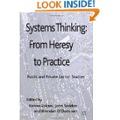
Product Description:
Systems Thinking is a topic which is at the forefront of how we think about management in the Public Sector and Service Industries. This collection from leading thinkers in the field takes a case study approach to a variety of issues which encompass topics such as Banking, Electrical Distribution, Manufacturing and Adult Social Care.
![]()
Systems Engineering Procedia
Launched in July 2011, Systems Engineering Procedia is a journal product focusing exclusively on publishing high-quality proceedings select systems engineering symposia. The journal is typically e-version but can provide hard copies subject to request from authors. ‘Systems Engineering Procedia’ enables fast dissemination so conference delegates can publish their papers in a dedicated online issue on ScienceDirect, which is then made freely available worldwide and accessible by millions of researchers.
![]()
International Journal of Decision Support System Technology (IJDSST) Special Issue on Decision Making Support Systems (DMSS) Development Methodologies: a Software-Systems Engineering Approach
Decision Making Support Systems (DMSS) are information systems that interactively support the decision making process of individuals and groups in life, public, and private organizations, and other entities. These systems include Decision Support
Systems (DSS), Executive Information Systems (EIS), Expert Systems (ES), Knowledge Based Systems (KBS), and Creativity Enhancing Systems (CES). Other DMSS, such as Executive Support systems (ESS), Management Support Systems (MSS), Artificially Intelligent Decision Support Systems (IDSS), and Decision Technology Systems (DTS), integrate the functions of DSS, EIS, ES, KBS, or CES, to provide more comprehensive support than the individual separate systems.
![]()
Last Word: A Worthwhile Destination
Systems, or Destination, Thinking requires “backwards thinking”—from your ideal future vision and goals to the present day—to realize the actions necessary to “close the gap” to achieve desired outcomes.
By Stephen Haines
With Systems Thinking as your “thinking guide,” your journey through work and life will be more clear, simple, and quick. Systems, like ourselves, are made up of a set of components that work together for the overall objectives of the whole. We are all living, human systems and so are our teams, organizations, communities, and societies.
![]()
Conferences and Meetings
Systems Thinking and Social Change ![]()
July 12 – 13, 2011, Johannesburg, South Africa
![]()
Systems Architecting Tutorial Presented by Eric Honour ![]()
July 22nd 2011, SAIC in the Research Park, Orlando, Florida, USA
![]()
International System Dynamics Conference
July 24 – 28, 2011, Washington, DC, USA
![]()
46th Annual International Logistics Conference and Exhibition (SOLE 2011)
August 2011
![]()
ISSC 2011 – 29th International System Safety Conference
Aug 8, 2011 – Aug 12, 2011, Las Vegas, Nevada, USA
![]()
Mayo Clinic Conference on Systems Engineering and Operations Research in Health Care ![]()
August 10 – 12, 2011, Rochester, Minnesota Kahler Hotel
![]()
21st International Conference on Systems Engineering (ICSEng 2011)
Las Vegas, NV USA , August 16 – 18, 2011
![]()
IHMSC 2011 – International Conference on Intelligent Human-Machine Systems and Cybernetics
Aug 26, 2011 – Aug 27, 2011, Hangzhou, China
![]()
TEAR 2011 : Trends in Enterprise Architecture Research (TEAR) Workshop
August 29, 2011, Helisinki, Finland
![]()
19th IEEE International Requirements Engineering Conference
August 29 – September 2, 2011, Trento, Italy
![]()
Fifth International i* Workshop (iStar’11) ![]()
Held in conjunction with the International Requirements Engineering Conference August 29-30, 2011, Trento, Italy
![]()
Workshop on Requirements Engineering for Systems and Systems-of-Systems
Held in conjunction with the International Requirements Engineering Conference August 30, 2011, Trento, Italy
![]()
Workshop on Dependable Systems of Systems ![]()
September 5 – 6, 2011, The Ron Cooke Hub, Heslington East Campus, University of York
![]()
19th International Conference on Case Based Reasoning
12-15 September 2011, Greenwich, London, UK
![]()
AVOCS 2011 – 11th International Workshop on Automated Verification of Critical Systems
September 12th – 15th, 2011, Newcastle University, Newcastle upon Tyne, UK
![]()
3rd Annual NASA Independent Verification and Validation Workshop
September 13 – 15, 2011, West Virginia University Erickson Alumni Center
![]()
International Conference on Industrial Engineering, Systems Engineering and Engineering Management for Sustainable Global Development
September 21-23, 2011, Spier Hotel and Conference Centre, Western Cape, South Africa
![]()
SBMF 2011 – 14th Brazilian Symposium on Formal Methods
September 26‑30, 2011, Sao Paulo, Brazil
![]()
Second Annual IIBA Conference
October 2011, More details TBA
![]()
XXXIX Brazilian Congress on Engineering Education – COBENGE 2011
October 03-06, 2011, Himmelblau Hotel, Blumenau, Santa Catarina, Brazil
![]()
SASO 2011 – Fifth IEEE International Conference on Self-Adaptive and Self-Organizing Systems
October 3-7, 2011, Ann Arbor, Michigan, USA
![]()
IEEE SRDS 2011 – 30th International Symposium on Reliable Distributed Systems
October 4-7, 2011, Madrid, Spain
![]()
AGTIVE 2011 – International Symposium on Applications of Graph Transformation with Industrial Relevance
October 4‑7, 2011, Budapest, Hungary
![]()
9th International Symposium on Automated Technology for Verification and Analysis
October 11-14, 2011, Taipei, Taiwan
![]()
MODELS 2011 – ACM/IEEE 14th International Conference on Model Driven Engineering Languages and Systems ![]()
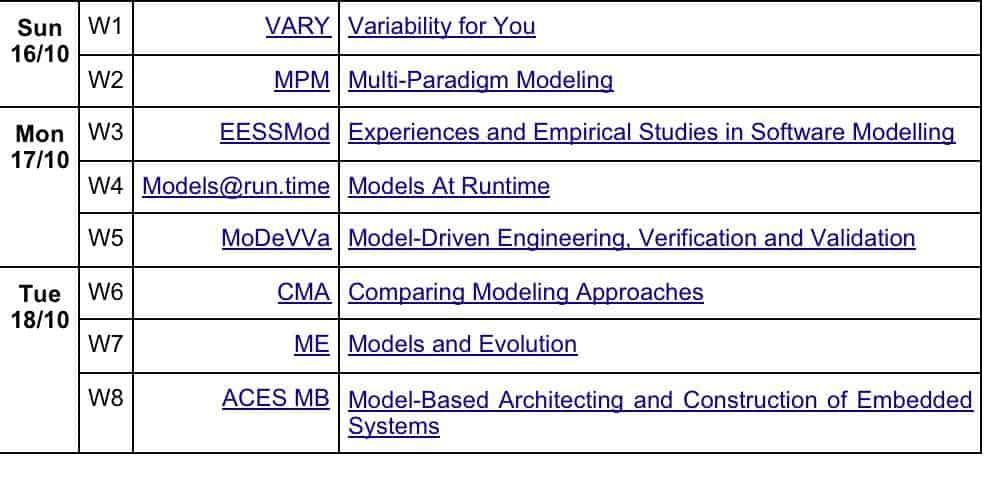
October 16-21, 2011, Wellington, New Zealand
![]()
APCOSE 2011 – Fifth Annual Asia-Pacific Systems Engineering Conference
October 19-21, 2011, Seoul, Korea
![]()
NDIA 14th Annual Systems Engineering Conference
October 24 – 27 2011, Hyatt Regency Mission Bay, San Diego, California, USA
![]()
SSEE 2011 – Society for Sustainability and Environmental Engineering 2011 International Conference
October 24-26, 2011, Brisbane Convention & Exhibition Centre, Brisbane, Australia
![]()
ICFEM 2011 – 13th International Conference on Formal Engineering Methods
October 25 – 28, 2011, Durham, United Kingdom
![]()
CEBM 2011 – 2011 International Conference on Engineering and Business Management (CEBM2011)
Oct 28 – 30, 2011, Shanghai, China
![]()
IIBA 2011 Conference
Oct 30 – Nov 3, 2011, Fort Lauderdale, Florida, USA
![]()
21st Annual Systems Thinking in Action® Conference
October 31-November 2, 2011, Westin Seattle Hotel, Seattle, WA, USA
![]()
ER 2011, 30th International Conference on Conceptual Modeling ![]()
October 31 – November 3, 2011, Brussels, Belgium
![]()
PoEM 2011 – The 4th IFIP WG8.1 Working Conference on the Practice of Enterprise Modelling
![]()
November 2-3, 2011, Oslo, Norway
![]()
INCOSE UK Annual Systems Engineering Conference (ASEC) 2011
November 9 – 10, 2011, Scarman Training and Conference Centre, Warwick Conferences, University of Warwick, UK
![]()
13th IEEE International High Assurance Systems Engineering Symposium ![]()
November 10-12, 2011, Boca Raton Marriott Hotel, 5150 Town Center Circle, Boca Raton, Florida, USA
![]()
11th Annual CMMI® Technology Conference and User Group
November 14 – 17, 2011, Hyatt Regency Denver Tech Center, Denver CO, USA
![]()
Brazilian Society of Dynamic Systems (SBDS) Annual Conference
16-18 November, 2011, Brasilia, Brazil
Website: www.sdsbrasil.org (under construction)
![]()
ICSSEA 2011 – 23rd International Conference Software & Systems Engineering and Their Applications
November 29- December 1st 2011, Paris, France
![]()
10th Anniversary & Annual Infrastructure and Regional resilience 2011 Conference ![]()
November 29 December 1, 2011, Gaylord National Hotel & Convention Center in Washington, DC, USA
![]()
Complex Systems Design & Management 2011
December 7-9, 2011, Cité Internationale Universitaire, Paris, France
![]()
CSER 2012 – Conference on Systems Engineering Research
March 19-22, 2012, St Louis, Missouri, USA
![]()
Fifth Edition of the Requirements Engineering Track (RE-Track’12) ![]()
Part of the 27th ACM Symposium on Applied Computing (SAC 2012)
March 25-29, 2012, University of Trento, Trento, Italy
![]()
SETE APCOSE 2012
April 30 – May 2, 2012, Brisbane Convention and Exhibition Centre, Brisbane, QLD, Australia
![]()
12th INTERNATIONAL DESIGN CONFERENCE DESIGN 2012
21 – 25 May, 2012, Dubrovnik, Croatia
![]()
Education & Academia
Council of Engineering Systems Universities (CESUN) Brings Together Engineering Systems Units From Around the World
Representatives from member universities of the Council of Engineering Systems Universities (CESUN) convened for the council’s annual meeting on May 3-4, at Stevens Institute of Technology. (Slides of presentations will soon be available on the CESUN website.)
The MIT Engineering Systems Division established CESUN in 2004 in partnership with other universities offering educational and research programs in engineering systems — with the main objective of broadening engineering education and practice. Since then, CESUN membership has grown to include 50 universities in North America, Europe, Asia and Australia.
![]()
![]()
Opportunity in Austria: Senior Researcher (PostDoc) ‑ Process and Quality Management
Software Competence Center Hagenberg GmbH (SCCH) has a vacancy for a senior researcher in Process and Quality Management to be filled as soon as possible.
![]()
Postdoctoral Research Assistant in Computer Science at Oxford Brookes University
- three-year post-doctoral research position is available to work on the project entitled ‘A Process for Risk-Driven Requirements Engineering and Analysis (APRES)’.
The aim is to explore multi-criteria decision analysis for project management in general, and requirements analysis in particular.
![]()
Post-Doctorate Position on Model-Driven Quality Engineering
AtlanMod INRIA research team at École des Mines de Nantes (http://www.emn.fr/x-info/atlanmod) has a 2-year (1+1) open postdoctoral position in the field of Model-Driven Engineering.
![]()
Johns Hopkins University’s Engineering for Professionals Program Announces Concentration in Human Systems Engineering
The Johns Hopkins University’s Engineering for Professionals program, part of the Whiting School of Engineering, is offering a new concentration in the field of human systems engineering. The concentration, an option in the part-time master’s degree program in systems engineering, will be available beginning in fall 2011.
![]()
University of Guelph, Canada Tenure Position in Systems Engineering
The School of Engineering at the University of Guelph is seeking to fill new tenure track position at the Assistant and Associate Professor level in the Engineering Systems and Computing program. At present the School comprises over 35 faculty members, 800 undergraduate students and 180 graduate students.
The Engineering Systems and Computing program is a multi-disciplinary engineering program that combines elements from Mechanical, Electrical, Computer, and Software engineering to enable graduates to design computer-based engineering systems. We are currently looking for a candidate that will play a key role in teaching senior courses in Systems Engineering. The successful candidates should have a multi-disciplinary background in Engineering with Ph. D. in Systems Engineering or closely related engineering field. The candidate will also be responsible to conduct a successful research program in the area of his/her expertise. Industrial experience in systems design will be considered an asset.
Qualified applicants for this position will be expected to teach core courses serving all engineering programs and program specific courses. They will provide service within and external to the University. It is expected that each new appointment will develop an independently funded research and development program and will contribute to teaching graduate students. Registration as a Professional Engineer in the Province of Ontario or the ability to obtain registration is an essential requirement of this position.
The City of Guelph is known for its educational and cultural life and has often been rated as one of the best cities to live in Canada. It is surrounded by rolling farmland, possesses an excellent public transit system and a wide variety of housing possibilities. The City is within easy driving distance of Metropolitan Toronto and recreational areas from the Niagara wine region to Lake Huron and the ski hills of Collingwood.
Applications will begin to be reviewed after August 1st, 2011 with the hiring process continuing until the position is filled.
The Director,
School of Engineering,
University of Guelph,
Guelph, Ontario, Canada N1G 2W1
![]()
FAX: 519-836-0227
Additional information: www.uoguelph.ca and www.uoguelph.ca/engineering
![]()
Some Systems Engineering-Relevant Websites
This website is devoted to providing information on the newly released version 2 of the Technology Program Management Model (TPMM).
TPMM is a Technology Readiness Level (TRL)-based stage-gate process model that contains engineered criteria, tailorable to any given technology development program. It is a management model that focuses on the full activity set (e.g. programmatics, systems engineering, transition management, verification) that can be used by a technology program manager to manage their technical development program to transition to an Acquisition Customer. Every activity contributes to the technology product. The results of each activity are documented by one or more deliverables in any given phase – the intention is no superfluous activities.
Participants in TPPM development are the U.S. Defense Acquisition University and DMD, LLC in Huntsville, AL, USA.
http://www.globaltti.com/systems-thinking
This website is inspired and grounded in the principles of Systems Theory. The think-tank believes that generating innovation, solving problems, creating solutions and consultancy, research and education must look at a systems approach in order to generate lasting solutions or truly sustainable innovation.
http://www.omgwiki.org/MBSE/doku.php?id=start
This website is the OMG Model-Based Systems Engineering (MBSE) Wiki. This wiki supports the activities of the MBSE Initiative that is sponsored by the International Council on Systems Engineering ( INCOSE) and the OMG Systems Engineering DSIG ( OMG SE DSIG).
This site is hosted by the Systems Engineering Program of Cornell University. It is dedicated to providing open source code and public domain materials promoting the use and development of SysML, the Systems Modeling Language.
http://www.firstlegoleague.org/
The best way to summarize FIRST LEGO League is to say that it is a robotics program for 9 to 16 year olds (9 to 14 in North America), which is designed to get children excited about science and technology — and teach them valuable employment and life skills. FLL can be used in a classroom setting but is not solely designed for this purpose. Teams, composed of up to ten children with at least one adult coach, can also be associated with a pre-existing club or organization, homeschooled, or just be a group of friends who wish to do something awesome.
http://www.usfirst.org/aboutus/content.aspx?id=34
USFIRST states that its mission is to inspire young people to be science and technology leaders, by engaging them in exciting mentor-based programs that build science, engineering and technology skills, that inspire innovation, and that foster well-rounded life capabilities including self-confidence, communication, and leadership.
Dean Kamen is an inventor, entrepreneur, and tireless advocate for science and technology. His passion and determination to help young people discover the excitement and rewards of science and technology are the cornerstones of FIRST (For
Inspiration and Recognition of Science and Technology).
http://www.societyforscience.org/isef/
The Intel® International Science and Engineering Fair® (Intel ISEF), the world’s largest international pre-college science competition, provides an annual forum for more than 1,500 high school students from 65 countries, regions, and territories to showcase their independent research. The Intel ISEF is the premier global science competition for students in grades 9–12.
Here are some systems engineering-related Linkedin Groups (http://www.linkedin.com):
Agile Systems Engineering Forum
This is a discovery forum exploring the notion of Agile Systems-Engineering as a means to deliver agile systems (e.g., large-scale, cost-effective, interoperable and rapidly reconfigurable) in a DoD Acquisition environment. Owner: Kevin Burke (340 members)
Cognitive Engineering and Decision Making (CEDM)
This is a linkedin group for members of the Human Factors and Ergonomics Society: Cognitive Engineering and Decision Making Technical Group. The group is to promote networking among students, professionals, and academics working in the area of human cognition and decision making in complex systems. Owner: Catherine Burns (826 members)
DAWIA IT Collaboration Network
This group aims to provide thought leadership for the 21st Century Transformation of the US DoD Acquisition Community’s systems engineering and program management practice, with special focus on the US Nation’s IT-intensive capabilities. Owner: Kevin Burke (323 members)
INCOSE Atlanta Chapter
The objectives of the INCOSE Atlanta Regional Chapter are to provide a focal point for dissemination of systems engineering
knowledge, and through its involvement with INCOSE.
Owner: James Smith (1 member)
INCOSE Brazil
This is a recently formed group for members of INCOSE Brazil, a society in formation with the intention of becoming the Brazil Chapter of the International Council On Systems Engineering (INCOSE)
INCOSE – CAZC
The International Council on Systems Engineering (INCOSE) Central Arizona Chapter LinkedIn Group provides a discussion forum for members.
Owner: Joseph Marvin (29 members)
INCOSE Chesapeake Chapter
The Chesapeake Chapter of the International Council on Systems Engineering (INCOSE) is a not-for-profit membership organization founded in 1994.
Owner: Glenn Townson, CISSP, ISSEP (50 members)
INCOSE Delaware Valley Chapter (PA,NJ,DE)
Serving Systems Engineering professionals in the Southeastern Pennsylvania, Northern Delaware, and Southern New Jersey areas (Delaware Valley Region), this chapter is part of the larger INCOSE organization Owner: Mike Gehringer (8 members)
INCOSE Finger Lakes Chapter
Their Mission is to foster the definition, understanding, and practice of world-class systems engineering in industry, academia,
and government in support of the mission of INCOSE.
Owner: Vicki Edwards (14 members)
INCOSE IL
System engineers in israel
Owner: Nir Shemesh (13 members)
INCOSE Italia
This is the group for the members of Italian Chapter of INCOSE to share knowledge in System Engineering Owner: Filippo Cristian Daffinà (107 members)Owner: Chris Delp (77 members)
INCOSE Los Angeles
Los Angeles Chapter of the International Council On Systems Engineering (INCOSE)
Owner: George Sousa (37 members)
INCOSE Midwest Gateway Chapter
The Midwest Gateway Chapter of INCOSE is dedicated to the strengthening of the Systems Engineering discipline.
Owner: Marcos C (6 members)
INCOSE New England Chapter
This is the LinkedIn site for the INCOSE New England Chapter group on LinkedIn.
Owner: Adeel Khalid (44 members)
INCOSE-NL
All members of INCOSE – Dutch chapter
Owner: Timo Giling (98 members)
INCOSE Northern Ohio Chapter
Networking group for members, potential members and friends of the Northern Ohio chapter of the International Council on Systems Engineering (INCOSE). When applying, please indicate your status. Owner: Eric Bobinsky (15 members)
INCOSE Orlando
INCOSE Orlando LinkedIn exists to extend SE technical efforts/issues.
Owner: Eddie B. Smith (34 members)
INCOSE Region V Huntsville Chapter
This is the LinkedIn site for the INCOSE Region V Huntsville Chapter in Huntsville, AL.
Owner: Bob Robinson (128 members)
INCOSE San Diego
INCOSE San Diego provides a focal point for local professionals to foster the definition, understanding, and practice of world-class systems engineering in support of the overall mission of INCOSE. Owner: Bob Rodgers (12 members)
INCOSE Saudi Arabia
This is a networking group for the INCOSE members in Saudi Arabia to share knowledge and experience in Systems
Engineering practices and processes.
Owner: Khaled Alajmi (8 members)
INCOSE Sweden
This group is open for anyone who is a member or a former member of INCOSE Sweden
Owner: Jonas Andersson (28 members)
INCOSE Türkiye Kolu
Türkiye’de görev yapan sistem mühendislerinin birbiriyle tanışmasını ve tecrübe paylaşımını sağlamak amacıyla ülkemizdeki
bütün sistem mühendislerini bu gruba katılmaya davet ediyoruz.
Owner: Yavuz Yapıcı (13 members)
INCOSE Washington Metropolitan Area Chapter (INCOSE-WMA)
The WMA – Chapter’s mission is to serve the systems engineering community in Washington, DC and its suburbs. The purpose of this group is to provide a networking forum for members of the WMA-Chapter as well as for those who are interested in joining.
Owner: Gabriele Belle, PhD. (130 members)
ISO/IEC JTC 1/SC7 Software and Systems Engineering
This group is for the professionals who contributed to the development of standards in ISO/IEC JTC 1/SC7, the Subcommittee responsible for the development of software and systems engineering standards in the Joint Technical Committee 1 of ISO/IEC. Owner: François Coallier (510 members)
Systems Engineering
This group is for systems engineers to connect, network and expand the knowledge as well as world of systems engineering. Owner: Punkil Patel (3,441 members)
Systems Engineering Jobs Forum
This is a place where the systems engineering community can share career experiences.
Owner: Maayan Rabbett (742 members)
![]()
Standards and Guides
ISO TC 236 – Project Committee: Project Management
The ISO TC 236 website lists all the relevant information on this Technical Committee, including the following list of working groups:

![]() Subcommittee/Working Group
Subcommittee/Working Group ![]()
![]() Title
Title
Terminology
TC 236/WG 1 The convener can be reached through the secretariat
Processes
TC 236/WG 2 The convener can be reached through the secretariat
Informative guidance
TC 236/WG 3 The convener can be reached through the secretariat
The ISO TC 236 Business Plan and meeting calander can be found on the website.
The work programme for ISO/TC 236 is set out on the ISO website in terms of the standard or project, the Standards Development Process Stage code and the International Classification for Standards (ICS) reference.
![]()
ISO/IEC JTC 1/SC 7 Systems engineering standards update
By Johan Amsenga
The ISO committee responsible for standardisation in systems and software engineering, ISO/IEC JTC 1/SC 7, recently held its biannual working group meetings and annual committee plenary in Paris, France. The SC 7 working groups are responsible for a wide range of areas that include life cycle management, documentation, process assessment, quality, service management and governance.
The following are just a few of the new and current projects that may be of interest to the systems engineering community.
ISO/IEC 29148, Life cycle processes – Requirements engineering
This document successfully passed the final stage of development, and will soon be published.
From the abstract:
This International Standard contains provisions for the processes and products related to the engineering of requirements for systems and software products and services throughout the life cycle. It defines the construct of a good requirement, provides attributes and characteristics of requirements, and discusses the iterative and recursive application of requirements processes throughout the life cycle. This International Standard provides additional guidance in the application of requirements engineering and management processes for requirements-related activities in ISO/IEC 12207 and ISO/IEC 15288. Information items applicable to the engineering of requirements and their content are defined. The content of this International Standard can be added to the existing set of requirements-related life cycle processes defined by ISO/IEC 12207 or ISO/IEC 15288, or can be used independently.
ISO/IEC TR 24748-2, Systems and software engineering – Life cycle management – Part 2: Guide for the application of ISO/IEC 15288 (System life cycle processes)
Although this document already completed its final development stage some time back, it has not yet been published due to an administration problem. It is hoped that this problem is now solved, and publication can go ahead.
From the abstract:
Currently, two International Standards exists that focus on life cycle processes (ISO/IEC 15288:2008, Systems and software engineering – System life cycle processes, and ISO/IEC 12207:2008, Systems and software engineering – Software life cycle
processes). The multi-part Technical Report ISO/IEC TR 24748 (Systems and software engineering – Life cycle management) is intended to facilitate the joint usage of the process content of the two life cycle process standards, which in turn may be used together with related standards such as the one for service management, and various other lower-level process standards. In this way, ISO/IEC TR 24748 provides unified and consolidated guidance on the life cycle management of systems and software. Its purpose is to help ensure consistency in system concepts and life cycle concepts, models, stages, processes, process application, key points of view, adaptation and use in various domains as the two International Standards (and others) are used in combination. It should help a project design and use a life cycle model for managing progress on a project.
Whereas Part 1 addresses guidance for cycle management of systems and software in generic terms, Part 2 focuses in on and expands the coverage of those aspects most relevant to systems. Part 2 also, in conjunction with Part 1, aids in identifying and planning the use of the life cycle processes described in ISO/IEC 15288:2008. The proper use of these processes will contribute to a project being completed successfully, meeting its objectives and requirements for each stage and for the overall project.
ISO/IEC 24748-4, Life cycle management – Part 4: Systems engineering planning
This document is currently in working draft, and is a revision of ISO/IEC 26702, Systems engineering – Application and management of the systems engineering process, which was the ISO adoption of IEEE Std. 1220. This document will focus on the processes applicable to technical planning (as opposed to project planning), and the information items produced through these processes. This will include the Systems engineering management plan (SEMP).
ISO/IEC 24748-6, Systems integration
The SC 7 Systems integration Study Group presented a comprehensive report, and a proposal for a new work item, at the SC 7 plenary. The new work item will be formally submitted to SC 7. A Study Group was formed in WG 7 to develop a Working Draft of the Technical Report dealing with Systems Integration.
ISO/IEC 42010, Architecture description
ISO/IEC 42010, 2nd edition, passed the final ballot, and should soon be published.
ISO/IEC 42030, Architecture evaluation
WG 40 proposed a new work item on architecture evaluation.
ISO/IEC TR 16337, Systems engineering – Systems engineering handbook
This Technical Report is an adoption of the INCOSE Systems engineering handbook v.3.2.1. The “.1” version includes many corrections from the technical review by the 78 member countries in ISO/IEC JTC 1/SC 7. The advantage to INCOSE is that as an ISO/IEC Technical Report it will reach a much broader group of potentially interested professionals worldwide.
ISO/IEC 24773, Systems and software engineering certification guidelines
A new work item was agreed to by WG 20 to expand ISO/IEC 24773:2008, Software engineering – Certification of software engineering professionals – Comparison framework. It was recommended that the updated International Standard should have the following parts:
- Software Engineering Certification;
- Information Technology Certification; and
- Systems Engineering Certification.
The new title is to be Systems and software engineering certification guidelines. The key elements for each area include:
- Defining requirements for the knowledge areas (body of knowledge);
- Requirements for skill types and levels; and
- Requirements for performance measurement (different depending on use of exam, interview, and/or documentation).
This update is important to INCOSE because it will give increased stature to the Certified Systems Engineering Professional program, if indeed it complies with the guidelines.
Systems and software engineering – System Engineering Lifecycle Profiles for Very Small Entities (VSEs) – Part 5-1-2:
Management and engineering guide: Generic profile group: Basic profile
From the background in the current document:
This document has been developed by the “SE for VSMEs” Working Group (Systems Engineering for Very Small and Micro Enterprises) of the Association Française d’Ingénierie Système (AFIS) /International Council on Systems Engineering (INCOSE).
As systems are becoming larger and more complex, the control by large systems engineering organizations of their suppliers, largely composed of small and micro organizations, is critical to the success of their projects.
Small and micro organizations are involved in schemes such extended enterprise, groups of enterprises, participation in innovation platforms. These schemes often induce profound organizational and cultural changes and the adoption of new engineering methodologies.
In 2009, AFIS and INCOSE decided to mandate an international WG to address these issues. The goal of the WG is to assist in the application of systems engineering for product development in very small and micro enterprises or small projects.
The WG worked on the following 3 axes:
- To continuously collect needs of small businesses and small projects through an online international survey (5 languages): http://isosurvey.logti.etsmtl.ca/
- To develop a set of Systems Engineering standards and guides, using the Generic profile group scheme of the ISO/IEC 29110 series, based on ISO/IEC15288:2008 standard and associated guides. The generic profile group is applicable to very small entities (VSEs) that do not develop critical software products. A Very Small Entity (VSE) is an entity (enterprise, organization, department or project) having up to 25 people.
- To develop a set of Deployment Packages to facilitate the implementation, by VSEs, of the systems engineering standards and guides such as: Project management, Requirements Engineering, System architecture, Interface management, Integration, verification, validation, Configuration and change management and, Product deployment.
This document, the first document developed by the WG, was developed using the Basic profile of the ISO/IEC 29110 series. The Basic Profile describes development of a single application by a single project team with no special risk or situational factors. Other documents will be developed for other profiles of the Generic profile group and for other profile groups.
Study groups
WG 7 established a Study Group to compile, evaluate, and recommend potential changes for future architecture and integration of ISO/IEC 15288 and ISO/IEC 12207 that have been identified through prior analysis, feedback from users of the standards, and results of activities of the advisory group on life cycle process harmonization. The Study Group will produce a report and a draft of the NWIP for the next phase of the integration process.
A SC 7 study group was created to establish the approach for the development of a framework for Service Oriented Systems Engineering (SOSE) and SOSE Standards. That framework will outline the process guidance, critical methods and related management specifications of SOA projects that can be used in developing, deploying, implementing and managing SOA solutions: It includes SOA project stages for design, development, management and government, and assessment methods for abilities and responsibility.
![]()
Some Definitions to Close On
Six Sigma
Six Sigma is a management philosophy developed by Motorola that emphasizes setting extremely high objectives, collecting data, and analyzing results to a fine degree as a way to reduce defects in products and services. Source: Whatis.com
Six Sigma: Six Sigma is a business management strategy originally developed by Motorola, USA in 1986.
Source: http://en.wikipedia.org/wiki/Six_Sigma
![]()
Six Sigma: The Six Sigma definition utilises two project methodologies which are:
1. DMAIC (Define – Measure – Analyze – Improve – Control)
DMAIC is used when Organisations want to improve existing processes which they have in place. This is delivered through a 5 step process which is:
1.1 Define: This will include defining what the problem is and what the results after following the DMAIC process should be.
1.2 Measure: This stage measures the key aspects of the current process whilst collecting any data relevant to it.
1.3 Analyze: The data collected is then collated and investigated to determine the various data links involved. This will include verifying the cause and effect relationships inherent in such processes as well as investigating the root cause of any defects discovered in the process.
1.4 Improve: This stage looks to implement improvements in the current process to rectify any defects uncovered. Techniques such as mistake proofing and design of experiments are used which are then tested in proof of concept pilot.
1.5 Control: Every process needs to have a control mechanism to ensure that any problems are picked up and corrected swiftly. Therefore in this stage systems such as production boards and statistical process controls are devised, implemented and monitored on an ongoing basis.
- DMADV (Define – Measure – Analyze – Design – Verify) / DFSS (Design for Six Sigma)
DMADV or DFSS is used by Organisations where there is either no existing process in place, or the process currently being utilised is unworkable.
It again follows a 5 phase process:
2.1 Define: This phase deals with determining the process goals which meet the business requirements and overall strategy.
2.2 Measure: This phase seeks to determine the elements of the process which are CTO or Critical to Quality such as production, development, stages of testing and of course project risks.
2.3 Analyze: As there is no existing process to analyze, a new high level design alternative needs to be devised which enables a seamless “conveyer belt” or production to be created which enables a consistent product to be produced.
2.4 Design: As this is a new process, the design needs to be planned and optimised. One would also often do a proof of concept at this stage to test the simulation thoroughly before applying it at a wholesale level.
2.5 Verify: This will involve running pilots in order to verify the new process and production prior to handing it over to the Organisation owners.
Source: http://www.my-project-management-expert.com/define-six-sigma.html
![]()
![]()
Project Performance International News
Alwyn Smit Stepping Down as Editor of SyEN
After 33 Editions, Alwyn Smit is putting away the keyboard as Editor of SyEN. I would like to say that Alwyn is taking a well earned rest, but those who know Alwyn will realise that Alwyn doesn’t rest. Alwyn is in fact undertaking advanced studies in Management, and, most importantly, intends to devote even more effort to improving systems engineering education in South Africa and its contribution South African society. Alwyn is very much a man on a mission, as are colleagues Duarte Goncalves (CSIR-DPSS), René Oosthuizen (INCOSE SA President) and others in the RSA systems engineering community.
I would like to thank Alwyn publicly for his outstanding contribution in editing SyEN. Alwyn’s contribution is on the record for all to see, by way of the archive of downloadable past editions at http://www.ppi-int.com/newsletter/systems-engineering-newsletter.php. A measure of the man is that Alwyn’s contribution has been totally voluntary, a mission of giving. A further measure is Alwyn’s insistence on being available in subsequent months to assist the new Editor of SyeN achieve a smooth transition. Alwyn and the new Editor co-edited this edition.
Thanks cobber, you are a bonzer bloke and an inspiration to me and others. Hooroo in your role as Editor of SyEN.
Robert Halligan, FIE Aust
Managing Director, Project Performance International
![]()
Welcome Ralph Young
I am delighted to welcome and introduce Dr. Ralph R. Young as the second Editor of SyEN, following the footsteps of Alwyn Smit. Ralph R. Young has invested his career in assisting individuals, projects, and organizations to improve and helping others to grow. He has a wide diversity of experience, including private sector, Federal Government, local government, military, and oversight of programs. He consults and speaks frequently concerning project management, requirements development and
management, and process improvement. Ralph has written a series of five books to date: Effective Requirements Practices (that describes what to do); The Requirements Engineering Handbook (that describes how to perform requirements-related work); Project Requirements: A Guide to Best Practices (which is written for program and project managers, to communicate the importance and value of incorporating good requirements practices); Performance-Based Earned Value (with Paul Solomon), which proposes a change to industry earned value management practices; and How to Save a Failing Project: Chaos to Control (with Steve Brady and Dennis Nagle) that identifies and describes good project management practices. Ralph contributed to another book, The 77 Sins of Project Management. Ralph enjoys the outdoors, boating, reading, writing, and family activities, especially six grandchildren. He plans to write another book, concerning leadership.
Ralph will lead the SyEN team editorially from the next Edition of SyEN, SyEN#34, due late July or early August.
Welcome Ralph, you bring an outstanding background and a passion to the task that make exciting this new chapter in the history of SyEN.
Robert Halligan, FIE Aust
Managing Director, Project Performance International
![]()
PPI at INCOSE IS11 in Denver
PPI attended and exhibited at the 2011 INCOSE International Symposium in Denver, USA over 18 to 24 June. Julie May and Joshua Freeman represented PPI and subsidiary company Certification Training International (CTI) respectively at the Corporate Advisory Board (CAB). Managing Director Robert Halligan lead the team.
PPI’s mascot Skippy the Kangaroo also participated in the event, meeting many old friends. Skippy was active at the social events, as the pic indicates (well, actually, the pic is from the home of outgoing SyEN Editor Alwyn Smit, but why let detail get in the way of a good story?).

Caught Red Handed (pic courtesy of Alwyn Smit)
![]()
PPI Course Calendar
The following updates have been made to PPI’s Course Schedule for 2011:
Systems Engineering 5-Day Course and Workshop has been scheduled for delivery in Sydney, Australia over 10 – 14 October, 2011
![]()
Systems Engineering Management 5-Day Course and Workshop Stellenbosch delivery has now been rescheduled to 14-18 November 2011
![]()
Requirements Analysis & Specification Writing 5-Day Course and Workshop scheduled for delivery in Stellenbosch over 14 – 18 November, 2011 has now been changed and will be delivered in Pretoria, South Africa instead over the same dates
![]()
For more information on our courses: http://www.ppi-int.com/
![]()
Project Performance International Events
Systems Engineering 5-Day Course
Upcoming locations include:
Adelaide, Australia
![]()
Brisbane, Australia
![]()
Amsterdam, The Netherlands
![]()
Munich, Germany
![]()
London, UK
![]()
View 2011 Systems Engineering Course Schedule
![]()
Requirements Analysis and Specification Writing 5-Day Course
Upcoming locations include:
Sydney, Australia
![]()
Stellenbosch, South Africa
![]()
Las Vegas, USA
![]()
Amsterdam, The Netherlands
![]()
View 2011 RA&SW Course Schedule
![]()
OCD & CONOPS in Capability Development 5-Day Course
Upcoming locations include:
Brasilia, Brazil
![]()
View 2011 OCD/CONOPS Course Schedule
![]()
Software Development Principles & Processes 5-Day Course
Upcoming locations include:
Amsterdam, The Netherlands
![]()
Stellenbosch, South Africa
![]()
Sydney, Australia
![]()
View 2011 Software Development Principles & Processes Course Schedule
![]()
Cognitive Systems Engineering 5-Day Course
Upcoming locations include:
Adelaide, Australia
![]()
Stellenbosch, South Africa
![]()
Las Vegas, USA
![]()
Sydney, Australia
![]()
View 2011 Cognitive Systems Engineering Course Schedule
![]()
Introduction to Software Development Principles & Processes 2-Day Seminar
View 2011 Introduction to Software Development Principles & Processes Seminar Schedule
![]()
Introduction to Requirements Analysis 1-Day Seminar
Upcoming locations include:
Adelaide, Australia
![]()
Melbourne, Australia
![]()
Sydney, Australia
![]()
View 2011 Introduction to Requirements Analysis Seminar Schedule
![]()
Preparing Great Requirements Specifications 1-Day Seminar
Upcoming locations include:
Adelaide, Australia
![]()
Melbourne, Australia
![]()
Sydney, Australia
![]()
View 2011 Preparing Great Requirements Specifications Seminar Schedule
![]()
PPI Upcoming Participation in Professional Conferences
PPI will be participating in the following upcoming events. We look forward to chatting with you there.
MICSSA 2011
![]()
Exhibiting | Pretoria, South Africa (18 – 21 July)
ISEM 2011
![]()
Exhibiting | Stellenbosch, South Africa (21 – 23 September)
NZDIA 2011
![]()
Exhibiting | Wellington, New Zealand (15 – 16 November)
![]()
Kind regards from the SyEN team:
Robert Halligan, Managing Editor, email: rhalligan@ppi-int.com
Alwyn Smit, Editor, email: asmit@ppi-int.com
Elise Matthews, Production, email: ematthews@ppi-int.com
Project Performance International
PO Box 2385, Ringwood, Vic 3134 Australia
Tel: +61 3 9876 7345
Fax: +61 3 9876 2664
Web: www.ppi-int.com
Email: contact@ppi-int.com
Tell us what you think of SyEN: email to contact@ppi-int.com
If you do not wish to receive a copy monthly of SyEN in future, please reply to this e-mail with “Remove” in the subject line. All removals are acknowledged; you may wish to contact us if acknowledgement is not received within 7 days.
COPYRIGHT 2011 PROJECT PERFORMANCE (AUSTRALIA) PTY LTD, ABN 33 055 311 941. May only be copied and distributed in full, and with this Copyright Notice intact.
